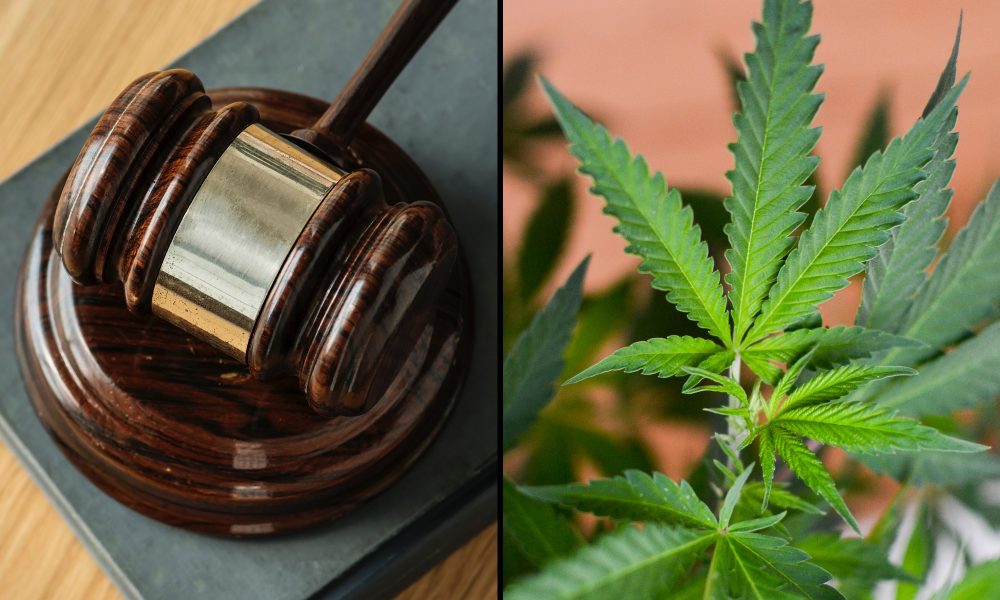Prohibitionists are again aiming to leverage the court system to stop voters from having the chance to enact marijuana legalization at the ballot, with new legal challenges threatening reform initiatives in Arkansas and Missouri.
Most recently, a lawsuit filed in Missouri on Friday argues that the language of a legalization measure that was certified by the secretary of state’s office this month violates the state Constitution.
The challenge, backed by the Colorado-based Protect Our Kids PAC, further contends that the Legal Missouri 2022 campaign did not collect sufficient signatures in required congressional districts and the state erroneously certified the measure. They’re asking the court to have the legalization question removed from the ballot.
Prior to the certification, there was early reporting suggesting that activists were coming up short in two districts. But following a review, Secretary of State Jay Ashcroft (R) determined that the campaign had actually come out ahead and announced that the measure would go before voters.
The lawsuit from Joy Sweeney, a staff member of the Community Anti-Drug Coalitions of America (CADCA), was filed on the deadline of the 10-day window for any challenges.
The complaint says that there’s reason to believe that activists did not collect enough valid signatures in “at least one of the congressional districts” that they needed to secure ballot placement.
“We’re proud to support this locally-led lawsuit, particularly because of the signs of corruption which are staining the entire process,” Luke Niforatos, CEO of Protect Our Kids, told Marijuana Moment on Monday.
“Only a few weeks ago, it was reported the legalization committee did not have enough signatures to qualify,” he said. “Suddenly, last week signatures were approved and the measure was qualified.”
The complaint is also largely premised on an interpretation of the Constitution’s single subject rule for ballot measures.
The plaintiff asserted that that the initiative “makes multiple substantive changes to the Missouri Constitution that will impact all citizens of Missouri,” and it does so not just by legalizing cannabis but also imposing licensing requirements and facilitating expungements, for example.
Because the measure is multifaceted and not solely proposing to amend the Constitution to end prohibition, the suit says it violates that single subject rule and must be invalidated.
“We are inspecting these signatures and believe many do not qualify, and we also believe this measure violates the state’s single subject laws,” Niforatos said. “Our hope is the State Supreme Court will act quickly to remove this referendum which has been smoke and mirrors from the start.”
While Sweeney filed the lawsuit in her capacity as a Missouri resident, she’s also affiliated with the national anti-legalization group CADCA, which is actively pushing supporters to oppose a federal marijuana legalization bill filed in the Senate last month.
In the meantime, Missouri health officials are already taking steps to prepare for voter approval of the legalization measure, and they’re accepting public comment on best practices for implementation.
Separately, in Arkansas, state officials recently confirmed that activists had turned in enough signatures to make the ballot. But an elections board took issue with the language of the ballot title and summary, and members declined to certify it. That led the campaign to file a lawsuit in the state Supreme Court to decide the measure’s fate.
The court gave activists a procedural victory by mandating that the state certify the initiative and place it on the ballot, but the case is ongoing and the votes could still be invalidated if the judges ultimately agree that the language is misleading.
—
Marijuana Moment is tracking more than 1,500 cannabis, psychedelics and drug policy bills in state legislatures and Congress this year. Patreon supporters pledging at least $25/month get access to our interactive maps, charts and hearing calendar so they don’t miss any developments.![]()
Learn more about our marijuana bill tracker and become a supporter on Patreon to get access.
—
An Arkansas police chief and attorney has since formed a political committee called Save Arkansas from Epidemic with the intent of opposing the legalization bid, and the state Supreme Court has allowed the committee to intervene in the case, The Arkansas Times reported.
UPDATE: WE won! (so far)
The Supreme Court today said the case would *not* be dismissed and that we *can* intervene. A Big Win for us, after the Petitioners (who proposed the ballot initiative) objected to us entering the case. https://t.co/auyghcFhci
— Kevin Sabet (@KevinSabet) August 19, 2022
Kevin Sabet of the national prohibitionist group Smart Approaches to Marijuana (SAM) submitted an affidavit in the case against the reform measure.
There are also several longtime activists in the state who are against the proposed initiative because they feel it unfairly tilts the scales, with excessive regulations that they feel would make the adult-use market uncompetitive and benefit a small pool of stakeholders.
The court system has become a consistent source of frustration for cannabis reform advocates in recent election cycles, with several efforts blocked following legal challenges, including some that focused on single subject rules.
Activists in several states found themselves defending voter-approved reform measures in court surrounding the 2020 election. Campaigns faced litigation over successful marijuana initiatives in Arizona, Mississippi, Montana and South Dakota, for example, with varying results.
A single subject challenge is also what kept medical cannabis legalization from qualifying for the 2020 ballot in Nebraska. And while activists in the state mounted another, bifurcated push for this year’s ballot, officials announced on Monday that the campaign came up short of the required signatures.
Here’s the state of play for other drug policy reform ballot measures in 2022:
North Dakota voters will have the chance to decide on marijuana legalization at the ballot this November, the secretary of state’s office confirmed.
In neighboring South Dakota, a marijuana legalization initiative has again qualified for the ballot.
Maryland elections officials have finalized the language for a marijuana legalization referendum that lawmakers placed on the November ballot, and have issued a formal summary of the reform proposal.
Colorado voters will have the chance to decide on a historic ballot initiative this November to legalize psychedelics and create licensed psilocybin “healing centers” where people can use the substance for therapeutic purposes.
The Oklahoma attorney general revised the ballot title of a marijuana legalization initiative that activists hope will be certified to go before the state’s voters, making mostly technical changes that the campaign views as satisfactory.
Michigan activists announced in June that they will no longer be pursuing a statewide psychedelics legalization ballot initiative for this year’s election and will instead focus on qualifying the measure to go before voters in 2024.
The campaign behind an effort to decriminalize drugs and expand treatment and recovery services in Washington State said in June that it has halted its push to qualify an initiative for November’s ballot.
While Wyoming activists said earlier this year that they made solid progress in collecting signatures for a pair of ballot initiatives to decriminalize marijuana possession and legalize medical cannabis, they didn’t get enough to make the 2022 ballot deadline and will be aiming for 2024 while simultaneously pushing the legislature to advance reform even sooner.
In March, California activists announced that they came up short on collecting enough signatures to qualify a measure to legalize psilocybin mushrooms for the state’s November ballot, though they aren’t giving up on a future election cycle bid.
An effort to put adult-use legalization on the statewide ballot in Ohio fizzled out this year, but the campaign did secure a procedural legal win that will allow them to hit the ground running for a planned 2023 reform initiative.
Locally, Ohio voters in at least seven cities will get a chance to join many of their neighboring jurisdictions in enacting local marijuana decriminalization at the ballot this November.
Voters in five Texas cities will also vote on local cannabis decriminalization measures this year.
Advocates have also worked to place local decriminalization ordinances on the ballot in West Virginia.
Wisconsin voters in at least half a dozen cities and counties will also be asked on November’s ballot whether they support legalizing, taxing and regulating cannabis in a manner similar to alcohol. Those Wisconsin advisory questions will be non-binding, however, and are intended to take the temperature of voters and send a message to lawmakers about where their constituents stand.
Read the lawsuit over Missouri’s proposed marijuana legalization initiative below:
Nebraska Medical Marijuana Initiatives Will Not Appear On November Ballot, State Announces
Photo elements courtesy of rawpixel and Philip Steffan.
Medical Disclaimer:
The information provided in these blog posts is intended for general informational and educational purposes only. It is not a substitute for professional medical advice, diagnosis, or treatment. Always seek the advice of your physician or other qualified healthcare provider with any questions you may have regarding a medical condition. The use of any information provided in these blog posts is solely at your own risk. The authors and the website do not recommend or endorse any specific products, treatments, or procedures mentioned. Reliance on any information in these blog posts is solely at your own discretion.







